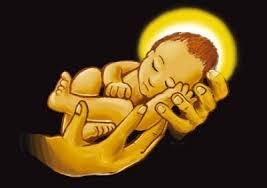Let there be! – And It Happened. The Word Became Flesh.
The evangelist does not even try to convey the greatness of the moment – he records Mary's conversation with the angel, but it is the angel who speaks, and Mary only asks a question in order to finally make a decision. It is precisely this decision of Mary that gives God the opportunity to perform a new miracle of creation: Let there be! – Happened. God – the Word became flesh.
At the moment of the Incarnation, God enters into the history of the world as Man. In order for man to know what he really is, God Himself became Man, because only He knows what work He intended, and how sin has corrupted this work. To make corrections, He needed a human body – it will be given to Him by His Virgin Mother, Mary. In this event, Mary's greatness is revealed. The initiative came from God, but the decision to accept God's proposal was made by Mary: “Behold, I am the handmaid of the Lord. May it be done to me according to your word.”
Mary agrees to what the Father agreed to by sending His Son to earth.
We are confronted with the great mystery of God who becomes man. We can study, we can explore this truth, but it will not help us – this event, the more known is the more incomprehensible it becomes. How can God make his own what is so human: sadness, fatigue, pain, and at the same time experience hatred and betrayal? But this was the will of the Father, to which the Mother and the Son agreed. And the will of the Father, to which the Mother and the Son agreed, brings to men the joy of salvation, and to the Mother and the Son the joy of meeting redeemed people in the Father's house. Because the Annunciation is a reason for joy for everyone on earth and in heaven.
This passage of the Gospel is perhaps one of the most familiar to us, so much so that we could repeat it from memory. Moreover, every time we pray the Angelus, we remember this event without precedent in the history of the world. God dwelt in human flesh. But "besides this", Pope Francis writes in Desiderio desideravi – that the Incarnation is the only new event known to history, it is also the method chosen by the Trinity to open to us the path of communion. The Christian faith is either an encounter with him alive or it is not." Therefore, in contemplating this event, we should remember all those moments in which we experienced the presence of the living God and the encounter with him who lives in our midst.
The Annunciation is not only Mary's encounter with the Archangel Gabriel, but above all God's encounter with humanity. The most important thing happens between God and Mary as one of us. The Annunciation is the feast of the "in between." The freedom of God and the freedom of man meet. The most important takes place in this intimate space "in between". Where God's humble omnipotence meets man's free "yes”, great things always happen.
The moment of the Annunciation was decisive for all humanity. That is when the Word became flesh. Mary's consent was fraught with consequences, it influenced the fate of the whole world. It was also an event that determined the whole future of Mary. No wonder she remembered them in all the details that she was able to recreate even decades later, when she told them to St. Luke.
In a 2019 letter to priests, Pope Francis wrote: "I myself like to call this “the Deuteronomic memory of our vocation”; it makes each of us go back “to that blazing light with which God’s grace touched me at the start of the journey. From that flame, I can light a fire for today and every day, and bring heat and light to my brothers and sisters. That flame ignites a humble joy, a joy which sorrow and distress cannot dismay, a good and gentle joy" It is necessary to think back to the moment of the Annunciation, to rediscover ever anew the generosity of God and the immensity of his love, but also to return to all our moments of the Annunciation, in which we discover the same love and interventions of God in our personal history.”
Until Tomorrow
fr. george


